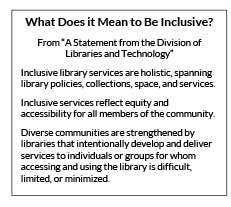Contact
Tom McCarthy, DPI Communications Director, (608) 266-3559MADISON — After five months of work, participants in the inaugural Inclusive Services Institute produced a self-assessment tool that will allow libraries to evaluate the inclusivity of their spaces, programming, services, and administrative operations.
 The idea of the institute took root during the Inclusive Services Retreat in February 2017, where public library and regional system staff identified the need for a statement on what inclusivity means within the context of public libraries. The statement, in part, interprets Wisconsin statue (Wis. Stat. sec. 43.24(2)(k)) which addresses the “promotion and facilitation of library service to users with special needs.” The statement was released in the spring of 2017 by the Wisconsin Department of Public Instruction (DPI) and updated during the beginning of the institute to include race and ethnicity.
The idea of the institute took root during the Inclusive Services Retreat in February 2017, where public library and regional system staff identified the need for a statement on what inclusivity means within the context of public libraries. The statement, in part, interprets Wisconsin statue (Wis. Stat. sec. 43.24(2)(k)) which addresses the “promotion and facilitation of library service to users with special needs.” The statement was released in the spring of 2017 by the Wisconsin Department of Public Instruction (DPI) and updated during the beginning of the institute to include race and ethnicity.
“Libraries provide crucial services and information, and exist as a cornerstone of so many Wisconsin communities,” said State Superintendent Tony Evers. “The passionate efforts of these library staff are important in ensuring these spaces are welcoming and accessible to all people.”
The institute — comprised of 16 public library and regional system staff, as well as four members of the leadership team — first convened in March for an intensive three-day conference. During this session, the participants formed teams, each dedicated to further examining specific aspects of library services through the lens of inclusion. Teams continued to work remotely, then during the August 12-14 session in Madison, consolidated their work, creating the self-assessment tool as a beta version.
During both the March and August sessions, participants engaged in deep dialog and awareness building within a variety of social issues, reflecting on the many aspects of inclusivity. In the months between sessions, the teams created a series of criteria or questions to eventually be combined into the self-assessment tool.
Examples of such questions are: Does the library offer programming for diverse audiences? Are printed library program marketing materials available in alternate formats such as Braille, large print, and electronic text? Do staff understand the meanings of the various words associated with LGBTQ/gender expressions? Are spaces in the library accessible to individuals with a variety of needs and interests?
Because each team was focused on a specific aspect of inclusivity, the combined criteria will be comprehensive and deep, addressing all layers and facets of inclusivity in libraries.
“No two libraries are the same,” said Tessa Michaelson Schmidt, the public library youth and inclusive services consultant at DPI. “This tool is meant to be holistic, contextual, and dependent on library staff’s engagement within their communities.”
“It is vital that libraries approach inclusive services from multiple angles,” said Shannon Schultz, DPI’s public library administration consultant. “The director, staff, and board of trustees all play a role in making the library welcoming, safe, and respectful. It’s not solely one person’s job.”
While the tool has taken shape and will soon be disseminated as a beta version to libraries throughout the state, participants envision it will eventually be interactive and packaged with other resources, such as webinars or training programs. The participants also emphasized part of DPI’s statement on inclusivity, noting that the everyday practice of providing inclusive services requires constant reflection, dialog, and assessment with and between members of the community — particularly those who are underserved or underrepresented — and all levels of the library staff and administration.
The Inclusive Services Institute was funded by a Library Services and Technology Act (LSTA) grant from the Institute for Museum and Library Services administered by the Public Library Development Team at the Wisconsin Department of Public Instruction.
Inclusive Services Institute Teams and Participants
Who is Responsible? Service Providers and Policy (Governance, Administration, Staffing)
- Martha Bauer, Brewer Public Library, Southwest Wisconsin Library System
- Irma Keller, Tomah Public Library, Winding Rivers Library System
- Jessica MacPhail, Racine Public Library, Lakeshores Library System
- Glenny Whitcomb, Chilton Public library, Manitowoc-Calumet Library System
What the Library Has to Offer (Collections, Resources, Programs, Services)
- Kristina Gomez, Milwaukee Public Library, Milwaukee County Federated Library System
- Mark Jochem, New Berlin Public Library, Bridges Library System
- Samantha Johnson, Augusta Memorial Public Library, Indianhead Federated Library System
- Susan Younger, Wautoma Public Library, Winnefox Library System
Where the Interactions Take Place (Facility, Access)
- Emilie Braunel, Plum Lake Public Library, Northern Waters Library Service
- Bobbie Kuehn, Brown County Library, Nicolet Federated Library System
- Laurie Ollhoff, T.B. Scott Free Library, Wisconsin Valley Library Service
- Holly K. Smith, Monarch Library System
Community Engagement (Community Relations, Funding, Self-Care)
- Rene Bue, Hedberg Public Library, Arrowhead Library System
- Shauna Koszegi, Sun Prairie Public Library, South Central Library System
- Lisa Rivers, Southwest Library, Kenosha County Library System
- Elizabeth Timmins, Muehl Public Library, Outagamie Waupaca Library System